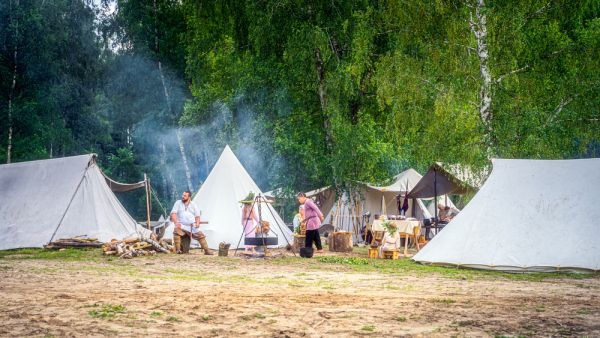Turkey has discovered new findings in the Asagipinar archeological excavations in Turkey's northwestern Kirklareli province that will be passed down to future generations in an open-air time tunnel on the site.
Started in 1993, the studies on the site revealed the traces of the region's oldest farming communities which brought agriculture and village settlement from Anatolia to Thrace.
8,000-year-old village life to be exhibited in northwestern Turkeyhttps://t.co/zME5FT4he6 pic.twitter.com/XEox9RZgyo
— Yeni Şafak English (@yenisafakEN) October 6, 2021
As the studies concluded recently, a project Open Air Museum and Visitor Reception Center has been launched with a 2,600,000 liras (over $291,500) budget funded by the local Culture and Tourism Directorate and IPA Cross-border Co-operation Programme.
A wooden time tunnel for the visitor reception center and the basic construction works of the museum have been completed, and models representing humans, animals, tools, and equipment of the 8,000-year-old village life have been placed in the open-air museum.
Kırklareli Culture and Tourism Director Veli Sen told Anadolu Agency that the village life of the year 6,000 B.C. will be presented to the future generations through the project
The remnants of the oldest farming communities of the region give insights into the lifestyles of ancient village communities, he said.
“It is fair to say that Asagipinar is humanity's common heritage, village settlement, and the first example of a village community," Sen continued. "We know that the village settlement communities that came from Anatolia lived here for a while, and then moved to Europe and other regions."
8,000-year-old village life to be exhibited in northwestern Turkey - https://t.co/iK8SggUyqV pic.twitter.com/1WTdnZUman
— Tourexpi (@TourExpiNews) October 7, 2021
Sen said: "The visitors coming here will be informed about the human lifestyle of the era."
The project is expected to be completed by the end of 2023.
This article has been adapted from its original source.











![Turkish series "Ask-ı Memnu" [Forbidden Love]. Turkish series "Ask-ı Memnu" [Forbidden Love].](/sites/default/files/styles/d02_traditional/public/2026-02/%D8%A3%D8%A8%D8%B7%D8%A7%D9%84-%D9%85%D8%B3%D9%84%D8%B3%D9%84-%D8%A7%D9%84%D8%B9%D8%B4%D9%82-%D8%A7%D9%84%D9%85%D9%85%D9%86%D9%88%D8%B9.jpg?h=c673cd1c&itok=nhq8-5rH)
